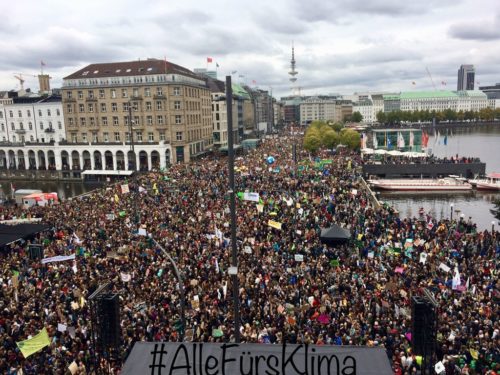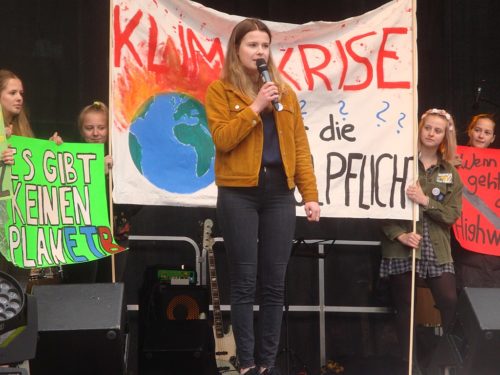Young People Win Climate Case in Germany
Germany’s top court has ruled that parts of the country’s 2019 climate action law must be changed because they don’t do a good job of protecting young people. The result was a big victory for the nine young people who started the lawsuit.
The court case highlights an important part of the climate crisis: the climate crisis will affect young people far more than adults. That’s because the effects of global warming will become more serious over time. As young people become adults, they’ll be left to deal with any problems that today’s adults have ignored.

Climate Crisis
The climate crisis is a global emergency caused by the change in weather patterns around the world because of human activity.
The world is getting hotter, mainly because humans are burning “fossil fuels” like coal, oil, and natural gas to make energy. These fuels give off pollution called “greenhouse gases” or “carbon emissions”, which make the climate emergency worse.
The effects of climate change can already be seen: melting glaciers and polar ice, higher temperatures, heat waves, record dry periods, wildfires, record rains, and more strong hurricanes.
Scientists say the world must take strong action before 2030 to avoid the worst effects of the climate emergency.
In 2019, Germany passed a new law, promising that the country would be carbon neutral by 2050. The law made a detailed plan of action until 2030. But the law didn’t have any specific rules or plans for climate actions that would be taken between 2031 and 2050.
A group of nine young people aged 15 to 24 took the government to court over the law. They said that the government’s failure to plan carefully was putting their future lives in danger. Under the government’s plan, they felt like they would be left to deal with the most difficult emissions challenges when they were adults.

Last Thursday, the judges of Germany’s highest court agreed with the young people, ruling that parts of the German law didn’t follow Germany’s constitution. The judges said that not taking climate action threatened the basic right of young people to a decent future.
The young people had challenged the government’s law in four specific areas. The judges didn’t agree with all of the challenges. But having the court support even a part of their case is seen as a big victory.

Luisa Neubauer is one of the young people who sued. She works with the climate action group Fridays For Future. Ms. Neubauer said, “Climate protection is our basic right and that’s official now. This is a huge win for the climate movement. It changes a lot.”
The court has given the German government until the end of 2022 to fix the law. The climate law will now need to have a much more detailed plan for the actions that will be taken after 2030 to cut Germany’s pollution, allowing it to become carbon neutral by 2050.
Luisa Neubauer (above) is one of the young people who sued. She works with the climate action group Fridays For Future. Ms. Neubauer said, “Climate protection is our basic right and that’s official now. This is a huge win for the climate movement. It changes a lot.”
Germany’s government has said that it will quickly begin working to make the needed changes.
One important part of high court decisions like this is that they act as guides or examples for future decisions. This means that in the future, Germany’s lawmakers will be more likely to think about the climate future of young people as they create their laws.
Germany’s government has said that it will quickly begin working to make the needed changes. Above, Germany’s leader, Angela Merkel (left) and Peter Altmaier, minister for energy and the environment. Mr. Altmaier was one of the main people behind the law.
Other groups of young people around the world are also suing governments. Last year a group of six young people from Portugal began a suit against 33 European countries in the European Court of Human Rights.
Recently young people in Australia, Brazil, and the United Kingdom have also taken their governments to court over climate action.
Did You Know…?
In 2015, a group of students sued the US government for not taking climate action, even though it knew the climate crisis was serious. That case has gone through several courts and may wind up in front of the US Supreme Court.


